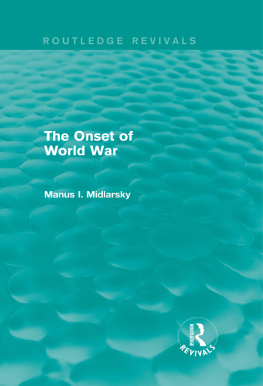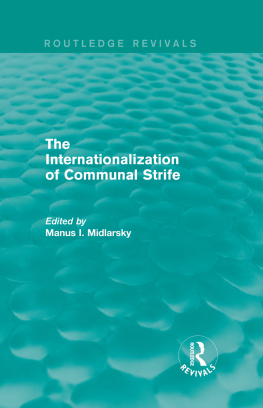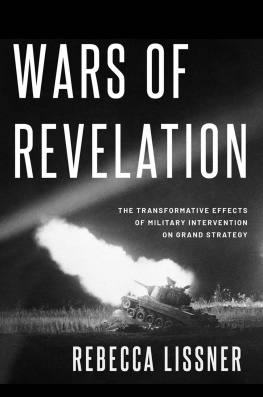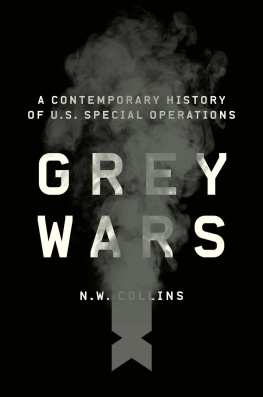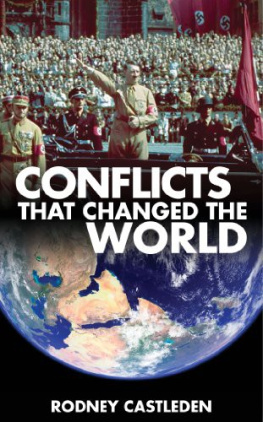Routledge Revivals
The Onset of World War
First published in 1988, this historical and quantitative analysis of war defines systemic world wars as conflicts of wide scope and intensity, which leave profound historical legacies in their wake. Manus Midlarsky examines various possible explanations for the onset of such past wars as the Peloponnesian War, the Thirty Years War, and World Wars I and II. Midlarsky develops his basic theory of systemic war, outlining the reasons for the absence of wars of this magnitude and describing the violations of certain structural conditions that are associated with the onset of world war.
A timely and relevant reissue, this insightful analysis will be of particular value to those with an interest in International Relations, War and Peace Studies, Military History, and Security Studies.
The Onset of World War
Manus I. Midlarsky
First published in 1988
by Unwin Hyman Ltd
This edition first published in 2014 by Routledge
2 Park Square, Milton Park, Abingdon, Oxon OX14 4RN
and by Routledge
711 Third Avenue, New York, NY 10017
Routledge is an imprint of the Taylor & Francis Group, an informa business
1988 Manus I. Midlarsky
The right of Manus I. Midlarsky to be identified as author of this work has been asserted by him in accordance with sections 77 and 78 of the Copyright, Designs and Patents Act 1988.
All rights reserved. No part of this book may be reprinted or reproduced or utilised in any form or by any electronic, mechanical, or other means, now known or hereafter invented, including photocopying and recording, or in any information storage or retrieval system, without permission in writing from the publishers.
Publishers Note
The publisher has gone to great lengths to ensure the quality of this reprint but points out that some imperfections in the original copies may be apparent.
Disclaimer
The publisher has made every effort to trace copyright holders and welcomes correspondence from those they have been unable to contact.
A Library of Congress record exists under LC control number: 87003569
ISBN13: 9781138793064 (hbk)
ISBN13: 9781315761527 (ebk)
THE ONSET OF WORLD WAR
Manus I. Midlarsky
Boston
UNWIN HYMAN
London Sydney Wellington
Copyright 1988 By Unwin Hyman, Inc.
All rights reserved
Unwin Hyman
8 Winchester Place, Winchester, MA 01890, USA.
The U.S. Company of
Unwin Hyman, Ltd,
Broadwick House, 15/17 Broadwick Street, London W1V 1FP, UK
Allen & Unwin Australia Pty Ltd,
8 Napier Street, North Sydney, NSW 2060, Australia
Allen & Unwin (New Zealand) Ltd, in association with the Port Nicholson
Press Ltd, 60 Cambridge Terrace, Wellington, New Zealand
Library of Congress Cataloging-in-Publication Data
Midlarsky, Manus I.
The onset of world war.
(Studies in international conflict; v. 1)
Bibliography: p. 244
1. International relationsResearch. 2. WarMathematical models.
I. Title. II. Series.
JX1291.M53 1987 327.16 873569
ISBN 0044970048
ISBN 0044970056 (pbk.)
British Library of Cataloguing in Publication Data
Midlarsky, Manus I.
The onset of world war.(Studies in international conflict; v. 1). 1. War
I. Title II. Series
355.02701 U21.2
ISBN 0044970048
ISBN 0044970056 Pbk
Set in 10 on 12 point Zapf Book Light by Getset (BTS) Ltd
and printed in Great Britain by Biddies of Guildford
For Liz, Susan, Miriam, and Michael
Contents
It is my pleasure to acknowledge the various agencies and persons who contributed immensely to the completion of this volume. A grant of the National Science Foundation, SES-83-09851, supported much of the research reported here, especially were developed initially in the National Endowment for the Humanities Summer Seminar for College Teachers that I directed in the summer of 1983. I will always be grateful to the participants in the seminar for their eager contributions to the discussions which made the flow of ideas so rich and compelling. An enrichment grant to the Center for International Relations of the University of Colorado; Boulder, by the office of the Vice Chancellor for Academic Affairs greatly facilitated both the research enterprise and completion of the manuscript.
Extremely able research assistance was rendered by Dale Cohen, Kun Park, and Kenneth Roberts. The excellent computer programming by Paul Buster and George Schimmel made possible the calculations reported here. The typing of the final manuscript was done by Amie Brooke, Lisa Donovan, Melinda Marquis and Cecilia Robinson at the Center for International Relations. The diligence, loyalty, and good humor of this office staff made the task of completing this volume immeasurably easier than it might have been.
is a revised version of an article that appeared in the Winter, 1983, issue of Polity. I am grateful to these journals and publishers for permission to reprint the relevant materials.
My gratitude also expands to Unwin Hyman not only for publishing this volume in a timely and expeditious fashion but also for providing the series Studies in International Conflict for which this book is the cornerstone publication. As series editor, I hope that it is a fitting point of departure. I am indebted to Neil Richardson for his generous comments on the manuscript.
Last, but not least, the support and encouragement of my family cannot go without mention. Without their support, this book could hardly have been written; for that and many other things, they have my enduring affection.
THE ONSET OF WORLD WAR
IN RECENT YEARS, a renewed interest has emerged in the problem of nuclear war as a form of global, general, or systemic war. The arms race between the superpowers, of course, has spurred this interest, as has the specter of nuclear winter as a deux ex machina which can effectively terminate the existence of human civilization as we know it and, perhaps, even other life forms. Physicians, such as Helen Caldicott, have been active recently in detailing the medical consequences of radioactive fallout and other immediate by-products of a nuclear exchange. The inherent dangers of the current international system, then, have awakened a keen sense of peril in the intellectual community.
Yet for all that we have learned about the truly horrendous consequences of widespread nuclear warfare, our knowledge of the potential causes of such a holocaust is all too meager. Knowledge of the consequences of nuclear war, of course, is desirable in helping to foresee the extraordinarily bleak future that attends the end of such a war. However, these consequences, especially those of a medical nature, are pitched at the level of the individual human being. Decision makers are expected to react with such horror to these likely outcomes affecting people that they would not dare to begin a nuclear war of this type. This is the sometimes unspoken premise of campaigns such as those waged recently by Physicians for Social Responsibility.
Although decision makers clearly can be affected by the horrors of such a war, we also know that they can be influenced by the structural properties of the international system in which they find themselves. Alliances, conflict relationships, dyadic commitments, historical influences, and disparities in power all can have impacts on international outcomes which even the foreseen horrors of nuclear war may not be sufficient to overcome. As such, scholars familiar with these and other properties of international systems are obliged to analyze the potential causes of widespread conflict involving nuclear weapons in order to clearly delineate, where possible, the antecedents of general or systemic war. In this fashion, perhaps one can lessen the potentially exclusive reliance on the expected impact of concepts, such as nuclear winter, on the presumably receptive and morally sensitive decision maker.

